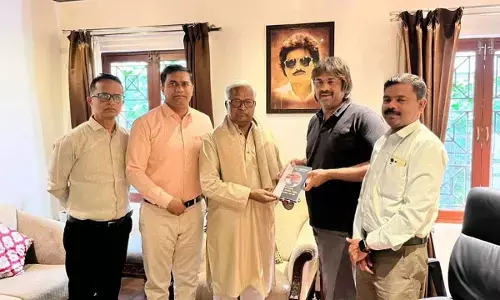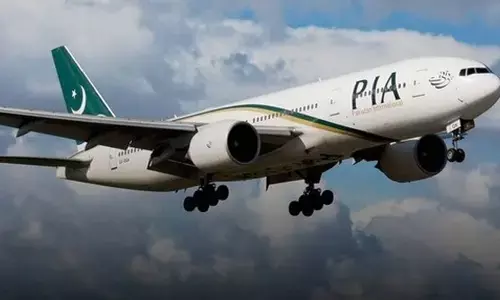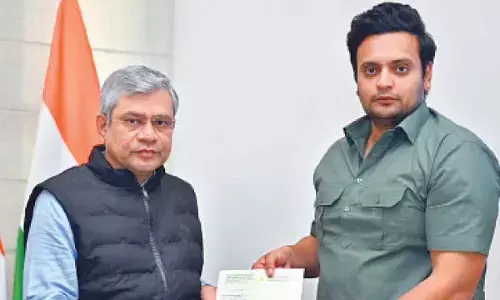MyVoice: Views of our readers 10th july 2020

On one side, the dreadful Covid-19 is still spreading severely across the globe infecting and killing lakhs of people, while on the other, the black-marketers with no mercy are making a killing over coronavirus medicine Ramdesivir by selling it for over ten times of the cost.
Hospitals, schools fish in troubled waters
On one side, the dreadful Covid-19 is still spreading severely across the globe infecting and killing lakhs of people, while on the other, the black-marketers with no mercy are making a killing over coronavirus medicine Ramdesivir by selling it for over ten times of the cost. Taking the advantage of the disastrous and helpless situation, even most of the private hospitals are also mercilessly charging lakhs of rupees from the Covid-19 patients. Also, taking advantage of this pandemic, most of the education institutions are minting money by collecting full fees and forcing the parents to purchase laptops and notepads from them along with the stationery. These types of merciless fleecing are no way different from robberies. We, the people feel ashamed that those who are resorting to do such earnings belong to medical and educational institutions. These type of remorseless money earners are more dangerous and harmful than the dreadful viruses.
T Sri Kumar, Jamia Osmania, Hyderabad.
Govt should dispose Secretariat debris judiciously
This is with regards to the report 'Debris poses big challenge' (THI, July 09). It is reported that the debris resulting from dismantling of Secretariat buildings, executed by the Telangana government, will cost Rs 18 to Rs 20 crores for its removal. However, material like Rangoon Teakwood used in the construction of oil buildings during the regime of Nizam is still a costly item that can fetch good price, if it is auctioned publicly. The teakwood value increases as time elapses since the wood can be utilised in the right way. Similarly, other items - old steel, and iron scrap etc - also can be disposed to the intending bidders. In this way, the lifting of scrap material by the transport can be minimised to some extent and also can cut down the expenditure. Therefore, I request the Chief Minister to kindly take appropriate action in this regard.
P Narahari, Hyderabad
Fisheries, a source of livelihood for poor
Fisheries, a sunrise sector of Indian economy, plays an important role in socio-economic development in view of its contribution to the food basket, nutritional security, sustainable large foreign exchange earnings, generation of employment and income, besides stimulating several subsidiary enterprises. Most important, fisheries are a source of livelihood for a large section of the economically backward population. India is an important country that produces fish through aquaculture in the world. It is a home for more than 10% of the global fish diversity. The total fish production during 2017-18 is estimated to be 12.60 million metric tonnes, of which nearly 65% is from the inland sector and about 50% is from culture fisheries. Presently, the country ranks second in the world in fish production accounting 7.73% of global production. The fisheries sector has contributed 1.24% to the country's Gross Value Added (GVA) and 7.28% share of agricultural GVA. Export earnings from the fisheries sector has been Rs 46,589 crore during 2018-19 and has registered an impressive average annual growth rate of about 9.71%. The domestic market in India consumes 75% of the fish produced. The Indian fish market was worth Rs 1,233 billion in 2019. The country has shown continuous and sustained increments in fish production since Independence, even though there were hurdles they were solved with the help of great and ambitious Indian scientists like Vishwa Gopal Jhingran, Dr Hiralal Chaudhuri and many more. Induced breeding – is a technique whereby ripe fish breeders are stimulated by pituitary hormone or any other. Synthetic hormone introduction to breed in captive condition. The stimulation promotes timely release of sperms and eggs. To honour Dr Hiralal Chaudhuri's outstanding achievement, the government of India in 2001 declared July 10 as "National Fish Farmers' Day". This day was first celebrated at CIFE (Central Institute of Fisheries Education) Mumbai. And today it is enthusiastically celebrated in all the fisheries education, research and extension institutes.
Rohini Kalyani, PVNRTU, Pebbair, Wanaparthy










